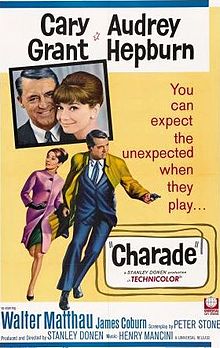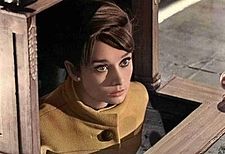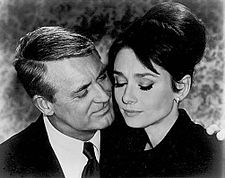- Charade (1963 film)
-
Charade 
original film posterDirected by Stanley Donen Produced by Stanley Donen Written by Marc Behm (story)
Peter Stone
(story and screenplay)Starring Cary Grant
Audrey HepburnMusic by Henry Mancini Cinematography Charles Lang Editing by Jim Clark Studio Stanley Donen Productions Distributed by Universal Pictures Release date(s) 5 December 1963 (US) Running time 113 minutes Country United States Language English Box office $13,474,588 (US)[1] Charade is a 1963 American film directed by Stanley Donen, written by Peter Stone and Marc Behm, and starring Cary Grant and Audrey Hepburn. The movie also features Walter Matthau, James Coburn, George Kennedy, Dominique Minot, Ned Glass, and Jacques Marin. It spans three genres: suspense thriller, romance, and comedy.
The film is notable for its screenplay, especially the repartee between Grant and Hepburn, for having been filmed on location in Paris, for Henry Mancini's score and theme song, and for the animated titles by Maurice Binder. Charade has been referred to as "the best Hitchcock movie that Hitchcock never made."[2]
Contents
Plot
Regina "Reggie" Lampert meets a charming stranger, Peter Joshua, on a skiing holiday in Megève. She returns to Paris, planning to ask her husband Charles for a divorce, but finds all of their possessions gone. The police notify her that Charles has been murdered, thrown from a train. They give Regina her husband's travel bag. At the funeral, Regina is struck by three odd characters who show up to view the body, including one who sticks the corpse with a pin and another who places a mirror in front of the corpse's mouth and nose, both to verify he is dead.
She is summoned to the U.S. Embassy, where she meets CIA administrator Hamilton Bartholomew . He informs her Charles was involved in a theft during World War II. As part of the OSS (the predecessor of the CIA), Charles, "Tex" Panthollow, Herman Scobie, Leopold W. Gideon and Carson Dyle were parachuted behind enemy lines to deliver $250,000 in gold to the French Resistance. Instead, they buried it, but were then ambushed by a German patrol. Dyle was badly wounded and left to die; the rest got away. Charles doublecrossed them, digging up the gold and selling it. He was killed but the money remains missing – and the U.S. government wants it back. Reggie recognizes the oddballs from the funeral in pictures shown to her by Bartholomew. He insists she has the money, even if she doesn't know where it is.
Peter offers to help. Reggie becomes attracted to him, even though he keeps changing his name (simultaneously amusing and confusing her) and unabashedly admits he is after her late husband's money as well. The dead man's partners in crime assume Reggie knows where the money is and demand their share. Unbeknownst to her, Peter is in league with them (under the pseudonym Alexander Dyle, Carson's brother), though none of the men trust each other.
They begin turning up dead — first Scobie is drowned in an overflowing bathtub, then Gideon has his throat slit while sneezing in an elevator. Reggie and Peter go to the location of Charles' last appointment and find an outdoor market. They also spot Tex there. Peter follows him.
It is Tex who finally figures out where the money is hidden. He sees several booths selling stamps. Charles had purchased rare stamps and stuck them on an envelope in plain sight just before he boarded his fateful train ride. The envelope was in his travel bag. Peter realizes the same thing and races Tex back to Reggie's hotel room. They come up empty. The stamps have been cut off the letter.
Reggie had given them to her friend's son for his stamp collection. By chance, she runs into them at the market, only to learn that the little boy has traded them away. Fortunately, the stamp seller is honest. He puts their total value at $250,000 and returns them to Reggie.
She returns to the hotel and finds Tex's bound body. Before he died, he was able to spell out in the dust the name of his killer: "Dyle." Figuring that Tex must have meant Alexander Dyle, a frightened Reggie telephones Bartholomew, who arranges to meet her. When she leaves the hotel, Peter spots her and gives chase through the streets of Paris and the subway.
Peter tracks her to the rendezvous and Reggie is caught out in the open between the two men. Peter tells her that the man she thought was Bartholomew is really Carson Dyle and that he was the one who killed the others. Another chase ensues, ending with Dyle's death.
Reggie insists on turning the stamps over to the proper authorities. Peter refuses to accompany her inside the embassy office. When she goes in by herself, she is shocked to find Peter (whose real name turns out to be Brian Cruikshank) sitting behind the desk. After proving to her that he is actually the government official responsible for recovered property, he promises to marry her...after she gives him the stamps.
The movie ends with a split-screen grid showing flashback shots of all of Brian's different identities, while Reggie says she hopes that they have lots of boys, so she can name them all after him.
Cast
- Cary Grant as Brian Cruikshank (alias Peter Joshua, alias Alexander Dyle, alias Adam Canfield)
- Audrey Hepburn as Regina "Reggie" Lampert
- Walter Matthau as Carson Dyle (alias Hamilton Bartholomew)
- James Coburn as Tex Panthollow
- George Kennedy as Herman Scobie
- Dominique Minot as Sylvie Gaudel
- Ned Glass as Leopold W. Gideon
- Jacques Marin as Insp. Edouard Grandpierre
- Paul Bonifas as Mr. Felix - Stamp Dealer
- Thomas Chelimsky as Jean-Louis Gaudel
Production
When screenwriters Peter Stone and Marc Behm submitted their script The Unsuspecting Wife around Hollywood, they were unable to sell it. Stone then turned it into a novel, retitled Charade, which found a publisher and was also serialized in Redbook magazine, as many novels were at the time. In Redbook it caught the attention of the same Hollywood companies that had passed on it earlier. The film rights were quickly sold to producer/director Stanley Donen. Stone then wrote the final shooting script, tailored to stars Cary Grant and Audrey Hepburn, with Behm receiving story co-credit.
Hepburn shot the film in the fall of 1962, immediately after Paris When It Sizzles, which she shot that summer in a number of the same locations in Paris, but production difficulties with that film caused it to be released four months after Charade.
When the film was released at Christmas, 1963, Audrey Hepburn's line, "at any moment we could be assassinated," was dubbed over to become "at any moment we could be eliminated" due to the recent assassination of President John F. Kennedy. The dubbed word stood out quite clearly and all official video releases of the film have since restored the original dialogue, though some public domain videos taken from original release prints still carry the redubbed line.
Cary Grant (59 years old at the time) was sensitive about the age difference between Audrey Hepburn (at age 34) and himself, and this made him uncomfortable with the romantic interplay between them. To satisfy his concerns, the filmmakers agreed to add several lines of dialogue in which Grant's character comments on his age and Regina — Hepburn's character — is portrayed as the pursuer.[3]
The screenwriter, Peter Stone, and the director, Stanley Donen, have an unusual joint cameo role in the film. When Reggie goes to the U.S. Embassy to meet with Bartholomew, two men get on the elevator as she gets off. The man who says, "I bluffed the old man out of the last pot — with a pair of deuces" is Stone, but the voice is Donen's. Stone's voice is later used for the U.S. Marine who is guarding the Embassy at the end of the film.
Awards
Grant and Hepburn were nominated for Golden Globes for Best Motion Picture Actor in a Musical/Comedy and Best Motion Picture Actress in Musical/Comedy. Screenwriter Stone received a 1964 Edgar Award from the Mystery Writers of America for Best Motion Picture Screenplay. Hepburn won the BAFTA Award as Best Actress.
American Film Institute recognition
- 2000 AFI's 100 Years...100 Laughs Nominated
- 2001 AFI's 100 Years...100 Thrills Nominated
- 2002 AFI's 100 Years...100 Passions Nominated
- 2005 AFI's 100 Years of Film Scores Nominated
Remakes
- Kokhono Megh (1968). Bengali-language adaptation. Starring Uttam Kumar and Anjana Bhowmik.[4]
- Somebody Killed Her Husband (1978). Starring Farrah Fawcett and Jeff Bridges. Loose remake. Released in Japan as Charade '79.
- The Truth About Charlie (2002). Starring Mark Wahlberg and Thandie Newton. Directed by Jonathan Demme. Peter Stone so disliked the remake that he refused his story credit on it, and is instead credited as Peter Joshua, one of Grant's character's aliases in Charade.[5]
- Chura Liyaa Hai Tumne (2003). Hindi-language adaptation. Starring Esha Deol and Zayed Khan. Directed by Sangeeth Sivan.
Public domain status
Before 1978, U.S. copyright law required works to include the word "Copyright", the abbreviation "Copr." or the "©" symbol.[6][7][8] Because Universal Pictures included no proper copyright notice with Charade, the film entered public domain in the USA immediately upon its release. Copies of this movie, made from film prints of varying quality, have been available on VHS and DVD based on its status in the public domain. However, while the film itself is public domain, the original music remains under copyright.[9]
Universal released an official VHS cassette of the film, transferred from original elements. However, when DVD was introduced, they licensed the film to The Criterion Collection rather than release it themselves. Competing with dozens of unofficial releases, the more expensive 2000 Criterion disc featured the only authorized professional transfer of the film on DVD. Universal eventually issued a version on DVD as a bonus feature included with the release of the remake The Truth About Charlie (2002). The film is available for free download at the Internet Archive.[10]
Criterion subsequently reissued the DVD in 2004 with a new 16x9 transfer with more accurate colors, and then released a Blu-Ray of the film in 2010.
Notes
- ^ "Movie Charade". The Numbers. http://www.the-numbers.com/movies/1963/0CRDD.php. Retrieved 14 November 2011.
- ^ Decent Films Guide: Charade
- ^ Eastman, John (1989). Retakes: Behind the Scenes of 500 Classic Movies. Ballantine Books. pp. 57–58. ISBN 0345353994.
- ^ "Kokhono Megh (1968)". www.imdb.com. http://www.imdb.com/title/tt0151205/. Retrieved 2009-01-07.
- ^ Allon, Yoram; Del Cullen,Hannah Patterson (2002). Contemporary North American film directors: a Wallflower critical guide. Wallflower Press. p. 132. ISBN 1903364523.
- ^ Copyright Basics. Washington, DC. U.S. Copyright Office. 2008, pp.3-4. www.copyright.gov
- ^ An Act to Amend and Consolidate the Acts Respecting Copyright, 60th Congress, 2d session. § 9 (1909)
- ^ Peter K, Yu (2007). Intellectual Property and Information Wealth: Copyright and related rights. Greenwood Publishing Group. pp. 143. ISBN 9780275988838. http://www.google.com/books?id=tgK9BzcF5WgC&dq=statute+of+anne+copyright&lr=&as_brr=3&source=gbs_navlinks_s.
- ^ Online search results for keywords "Henry Mancini Charade", from US Copyright Office.
- ^ Charade. Internet Archive, Feature Films. (Retrieved 2011-02-01.)
External links
- Charade (1963 film) at the Internet Movie Database
- Charade is available for free download at the Internet Archive [more]
- Charade (1963 film) at the TCM Movie Database
- Charade (1963 film) at AllRovi
- Criterion Collection essay by Bruce Eder
Films directed by Stanley Donen 1940s On the Town (1949)1950s Royal Wedding (1951) · Love Is Better Than Ever (1952) · Singin' in the Rain (1952) · Fearless Fagan (1952) · Give a Girl a Break (1953) · Seven Brides for Seven Brothers (1954) · Deep in My Heart (1954) · It's Always Fair Weather (1955) · Funny Face (1957) · The Pajama Game (1957) · Kiss Them for Me (1957) · Indiscreet (1958) · Damn Yankees (1958)1960s Once More, with Feeling! (1960) · Surprise Package (1960) · The Grass Is Greener (1960) · Charade (1963) · Arabesque (1966) · Two for the Road (1967) · Bedazzled (1967) · Staircase (1969)1970s 1980s Saturn 3 (1980) · Blame It on Rio (1984)Categories:- American films
- English-language films
- 1960s romantic comedy films
- 1963 films
- Edgar Award winning works
- Films directed by Stanley Donen
- American mystery films
- American comedy thriller films
- Comedy mystery films
- Universal Pictures films
- Films shot in Paris
- Films set in Paris
Wikimedia Foundation. 2010.


